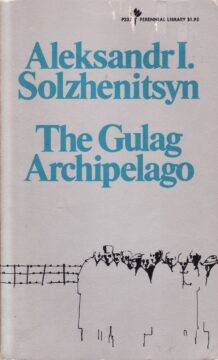Gary Saul Morson at The New Criterion:
 When Aleksandr Solzhenitsyn’s The Gulag Archipelago: An Experiment in Literary Investigation appeared in 1973, its impact, the author recalled, was immediate: “Like matter enveloped by antimatter, it exploded instantaneously!” The first translations into Western languages in 1974—just fifty years ago—proved almost as sensational. No longer was it so easy to cherish a sentimental attachment to communism and the ussr. In France, where Marxism had remained fashionable, the book changed the course of intellectual life, and in America it helped counter the New Left celebration of Mao, Castro, and other disciples of Marx, Lenin, and Stalin.
When Aleksandr Solzhenitsyn’s The Gulag Archipelago: An Experiment in Literary Investigation appeared in 1973, its impact, the author recalled, was immediate: “Like matter enveloped by antimatter, it exploded instantaneously!” The first translations into Western languages in 1974—just fifty years ago—proved almost as sensational. No longer was it so easy to cherish a sentimental attachment to communism and the ussr. In France, where Marxism had remained fashionable, the book changed the course of intellectual life, and in America it helped counter the New Left celebration of Mao, Castro, and other disciples of Marx, Lenin, and Stalin.
What was it that made this book so effective? And what did Solzhenitsyn mean by calling it “literary,” even though everything in it was factual? To answer these questions is to grasp why Gulag towers over all other works of the Soviet period and, indeed, over all literature since the middle of the twentieth century.
Before Solzhenitsyn, Western intellectuals of course knew that the Soviet regime had been “repressive,” but for the most part they imagined that all that had ended decades ago. So it was shocking when the book described how it had to be written secretly, with parts scattered so that not everything could be seized in a single raid.
more here.
Enjoying the content on 3QD? Help keep us going by donating now.
